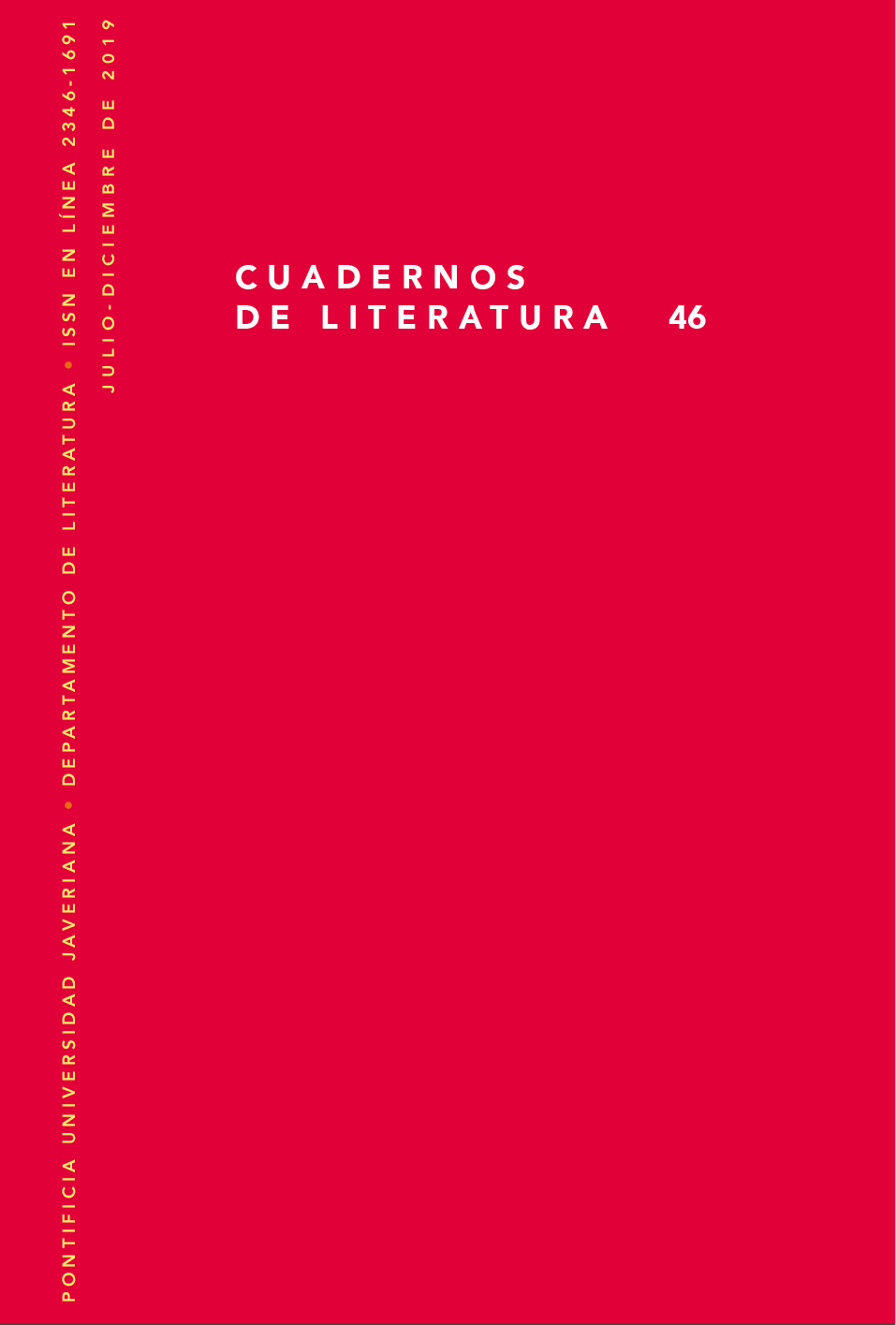Resumo
Este ensaio expõe a existência de um arquivo alternativo sobre a memória dos anos noventa. Através da análise dos romances Pim Pam Pum (1998) de Alejandro Rebolledo, La última vez (2007) de Héctor Bujanda, Bajo tierra (2009) de Gustavo Valle (2009) e Valle zamuro (2011) de Camilo Pino, demonstra-se um desarraigo constitutivo que possibilita o vazamento dos discursos nostálgicos da polarização política. Exprime-se, assim, a definição da Geração da Sexta-feira Negra para falar de subjetividades juvenis que sugerem continuidade histórica entre o neoliberalismo de finais do século XX e a Revolução Bolivariana de começos do século XXI.
Álvarez, Ignacio. “Todos contra Jameson: los alcances de la alegoría nacional y su valor para la lectura de dos novelas chilenas recientes”. Ponencia presentada al XIII Congreso Internacional de la Sociedad Chilena de Estudios Literarios. Santiago, 30 de septiembre de 2004. Web. 5 de junio de 2014.
Boym, Svletana. The Future of Nostalgia. Nueva York: Basic, 2001. Impreso.
Bujanda, Héctor. La última vez. Caracas: Norma, 2007. Impreso.
Coronil, Eduardo. El estado mágico. Naturaleza, dinero y modernidad en Venezuela. Caracas: Editorial Alfa, 2013. Impreso.
Derrida, Jacques. Mal de Arquivo. Uma Impressão Freudiana. Rio de Janeiro: Relume Dumará, 2001. Impreso.
Duchesne, Juan. Equilibrio encimita del infierno. Andrés Caicedo y la utopía del trance. Cali: Archivos del Índice, 2007. Impreso.
Duno, Luis. “Narrativas somáticas y cambio social: Notas para el cuadro venezolano”. Estudios 17.34 (2009): 401-435. Impreso.
Fabry, Geneviève e Ilse Logie. “Introducción”. Los imaginarios apocalípticos en la narrativa hispanoamericana contemporánea (s. XX-XXI). Eds. Geneviève Fabry, Ilse Logie y Pablo Decock. Berna: Peter Lang 2010. 11-32. Impreso.
Gomes, Miguel. El desengaño de la modernidad. Cultura y literatura venezolana en los albores del siglo XXI. Caracas: Universidad Católica Andrés Bello, 2017. Impreso.
Guerrero, Javier. “Culturas del cuerpo: La sagrada familia venezolana”. 452ºF. Revista Electrónica de Teoría de la Literatura Comparada 6 (2012): 17-38. Impreso.
Jameson, Fredric. “Third-World Literature in the Era of Multinational Capitalism”. Social Text 15 (1986): 65-88. Impreso.
Laclau, Ernesto. La razón populista. Buenos Aires: Fondo de Cultura Económica, 2005. Impreso.
Murguia, Eduardo Ismael. “Archivo, memoria e historia: cruzamientos y abordajes”. Íconos 41 (2011): 17-37. Impreso.
Ochoa Antich, Enrique. Los golpes de febrero. Caracas: Fuentes Editores, 1992. Impreso.
Pino, Camilo. Valle Zamuro. Caracas: Ediciones Puntocero, 2011. Impreso.
Rebolledo, Alejandro. Pim pam pum. Barcelona: Edición digital de Angi Vásquez, 1998/2013. Impreso.
Reguillo-Cruz, Rossana. Emergencia de culturas juveniles. Estrategias del desencanto. Bogotá: Editorial Norma, 2000. Impreso.
Rivas Rojas, Raquel. “Ficciones del exilio o los fantasmas de la pertenencia en la literatura del desarraigo venezolano”. Academia.edu 1.18. https:// www.academia.edu/4689442/Ficciones_de_exilio_o_los_fantasmas_de_ la_pertenencia_en_la_literatura_del_desarraigo_venezolano. Web.
Torres, Ana Teresa. La herencia de la tribu. Del mito de la Independencia a la Revolución Bolivariana. Caracas: Editorial Alfa, 2009. Impreso.
Valero E., Arnaldo. “Pin Pan Pun: Sicodelia, ruptura y mercado”. Contexto 5.7 (2001): 119-130. Impreso.
Valle, Gustavo. Bajo tierra. Caracas: Editorial Norma, 2009. Impreso.
El material gráfico analizado o directamente referido en el artículo, debe ser de alta calidad, presentarse en hojas individuales, en orden secuencial, y con una resolución mínima de 300 dpi en formatos JPG o TIFF. Los cuadros, diagramas, fotografías y gráficas deben estar acompañados de sus respectivos pies de foto, indicando la fuente de la que fueron tomadas, el título y su ubicación dentro del texto. Es responsabilidad del autor obtener el derecho de autor y permiso para reproducir las imágenes que desea utilizar en sus artículos. Este permiso debe ser para su reproducción impresa y online. Cuadernos de Literatura no reproduce cualquier imagen sin su respectiva autorización.
La revista Cuadernos de Literatura se encuentra registrada bajo la licencia Creative Commons Reconocimiento 4.0 Internacional. Por lo tanto, esta obra se puede reproducir, distribuir y comunicar públicamente en formato digital, siempre que se reconozca el nombre de los autores y a la Pontificia Universidad Javeriana. Se permite citar, adaptar, transformar, autoarchivar, republicar y crear a partir del material, para cualquier finalidad (incluso comercial), siempre que se reconozca adecuadamente la autoría, se proporcione un enlace a la obra original y se indique si se han realizado cambios. La Pontificia Universidad Javeriana no retiene los derechos sobre las obras publicadas y los contenidos son responsabilidad exclusiva de los autores, quienes conservan sus derechos morales, intelectuales, de privacidad y publicidad.
El aval sobre la intervención de la obra (revisión, corrección de estilo, traducción, diagramación) y su posterior divulgación se otorga mediante una licencia de uso y no a través de una cesión de derechos, lo que representa que la revista y la Pontificia Universidad Javeriana se eximen de cualquier responsabilidad que se pueda derivar de una mala práctica ética por parte de los autores. En consecuencia de la protección brindada por la licencia de uso, la revista no se encuentra en la obligación de publicar retractaciones o modificar la información ya publicada, a no ser que la errata surja del proceso de gestión editorial. La publicación de contenidos en esta revista no representa regalías para los contribuyentes.
El retiro de un artículo se solicitará por escrito con un documento impreso al Comité Editorial y se formaliza con la respuesta oficial del Comité.


